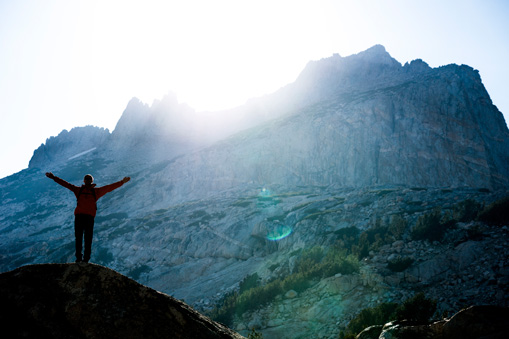The views expressed in our content reflect individual perspectives and do not represent the authoritative views of the Baha'i Faith.
If the wayfarer’s goal be the dwelling of the Praiseworthy One (Mahmud), this is the station of primal reason which is known as the Prophet and the Most Great Pillar. Here reason signifieth the divine, universal mind, whose sovereignty enlighteneth all created things… – Baha’u’llah, The Four Valleys, p. 52.
Baha’u’llah uses the Persian word “Mahmud” in the opening sentence of the second valley in his book The Four Valleys, which describes the noble, admirable and praiseworthy aspects of God—and refers to “the divine, universal mind” of the Creator, where all enlightenment originates.
In gorgeous, lofty language, The Four Valleys speaks directly to the true seeker’s innermost being.
The Four Valleys commences as all paths do, with an unfettered search after truth and an exploration of the self. In the second stage on the journey, which expands the self past its limits toward a wider expanse of consciousness, Baha’u’llah asks seekers to open their hearts, minds and souls to the knowledge of God. In the second stage, The Four Valleys suggests, “man should make ready his heart that it be worthy of the descent of heavenly grace… – p. 54. In the second stage, which Baha’u’llah calls “the station of primal reason,” the tests begin.
“On this plane,” He writes, “the traveler meeteth with many a trial and reverse.” – p. 53.
Just like every mythological hero and heroine, each true seeker undergoes tests and trials. When we climb out of one valley and hike up our spiritual path toward the next, we find mountains to cross.
These peaks can confront us with cold, wind-whipped and treacherous ordeals, severe tests of our courage and stamina, seemingly insurmountable obstacles; but they can also serve as vantage points, attained with exertion and struggle, producing joy and exultation, and ultimately revealing magnificent vistas, granting us the glorious, standing-above-it-all encounter some call enlightenment:
In general, the mountain, the hill, and the mountain-top are all associated with the idea of meditation, spiritual elevation and the communion of the blessed. – Cirlot’s Dictionary of Symbols, p. 210.
 Moving beyond the limitations of the self and overcoming tests on the path helps our spirit scale un-trodden heights of joy and happiness.
Moving beyond the limitations of the self and overcoming tests on the path helps our spirit scale un-trodden heights of joy and happiness.
What Abraham Maslow called (appropriately enough) the “peak experience,” this natural desire to transcend the normal reality of day-to-day life and experience ecstasy and transcendence occurs to all people. In its higher and progressively more permanent forms, it leads to new stages of consciousness where our vision multiplies and our vistas enlarge, all by moving past the limitations of our mere selves and seeing a bigger and more encompassing picture. Unlike a temporary high, the ecstasy of a peak-experience becomes a lasting part of those who seek and attain it.
Enlightenment, purity, awareness, ecstasy–all of these words describe self-transcendence and peak-experience. People pursue all sorts of outward activities to reach the point of such exhilaration in life, and yet the founders and prophets of the great Faiths continue to remind humanity that it lives inside us, waiting for liberation. Such transcendence, Maslow writes, frees us from ourselves:
The person in the peak-experiences feels more integrated (unified, whole, all of a piece) than at other times. As he gets to be more purely and singly himself he is more able to fuse with the world, with what was formerly not-self… The person in the peak-experiences usually feels himself to be at the peak of his powers, using all his capacities at the best and fullest… He feels more intelligent, more perceptive, wittier, stronger, or more graceful than at other times. He is at his best, at concert pitch, at the top of his form. He is no longer wasting effort fighting and restraining himself; muscles are no longer fighting muscles. In the normal situation, part of our capacities are used for action, and part are wasted on restraining those same capacities. Now there is no waste; the totality of the capacities can be used for action. He becomes like a river without dams. – Toward a Psychology of Being, pp. 104-6.
These spiritual peaks, as Maslow and many others have pointed out, function as the headwaters of our happiness and joy. This kind of peak-experience waits for every seeker who starts to shed the self.
At the peaks, we can see the next valley, map our course, and breathe the rarified air of the spiritual summit. Like the conquering mountaineer, we can plant the standards of victory over self. We unify and harmonize our disparate parts on the peaks, we grow lighter and feel less bound by the earth, we perceive the vastness and variety of life. This enlightenment breaks the bars of our prison and lets us fly.
Break all fetters and seek for spiritual joy and enlightenment; then, though you walk on this earth, you will perceive yourselves to be within the divine horizon. – Abdu’l-Baha, Abdu’l-Baha in London, p. 87.
















Comments
Sign in or create an account
Continue with Googleor